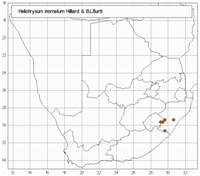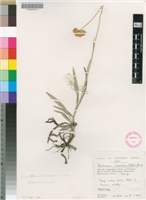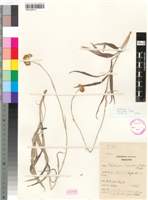Origin of name:
in = in, within, amongornatus = equipped, adorned
Diagnostic characters:
Compact inflorescence on long stalkGrey hairy leavesMedium-sized headsYellow bracts
Description:
Perennial herb, stock slender, woody, stem solitary, erect to c. 500 mm, simple, slender, white-felted. Leaves mostly radical, up to 150 x 10 mm, linear-lanceolate, thin, apex acuminate, base tapered, flat, petiole-like, upper surface scabridulous, often lightly cobwebbed, lower thinly greyish-white felted, triplinerved, side veins invisible, cauline leaves similar but sessile, broad-based, clasping, rapidly passing into distant bracts. Heads homogamous, narrowly campanulate, c. 4 x 2.5 mm, many in compact cymose clusters arranged in a dense flat-topped corymbose panicle 20�30 mm across. Involucral bracts in c. 4 series, graded, loosely imbricate, woolly at base, inner equaling flowers, obtuse, pellucid, light golden-brown, not radiating. Receptacle with fimbrils a little longer than the ovaries. Flowers 9�13. Achenes 0.75 mm long, glabrous. Pappus bristles many, scabrid, bases cohering by patent cilia, lightly fused as well.
Flowering in December and January.
Distribution:
Known only from Mpendhle, Underberg and Alfred districts in KwaZulu-Natal, where it grows in damp or marshy grassland, often on steep slopes, 1 800 to 2 100 m.
Grassland Biome.
Taxonomy:
Literature:
Helichrysum inornatum Hilliard & Burtt in Notes R. bot. Gdn Edinb. 34: 81 (1975); Hilliard, Compositae in Natal 181 (1977).
Type:
KwaZulu-Natal, Alfred distr., Ngeli Mtn, SE. end, c. 1 800 m, Hilliard & Burtt 5766 (NU, holo.; E; K; S, iso.).
Synonym(s):
Vouchers:
Hilliard & Burtt 7888 (E; K; NU; PRE; S); Wright 378 (E; K; NU).



